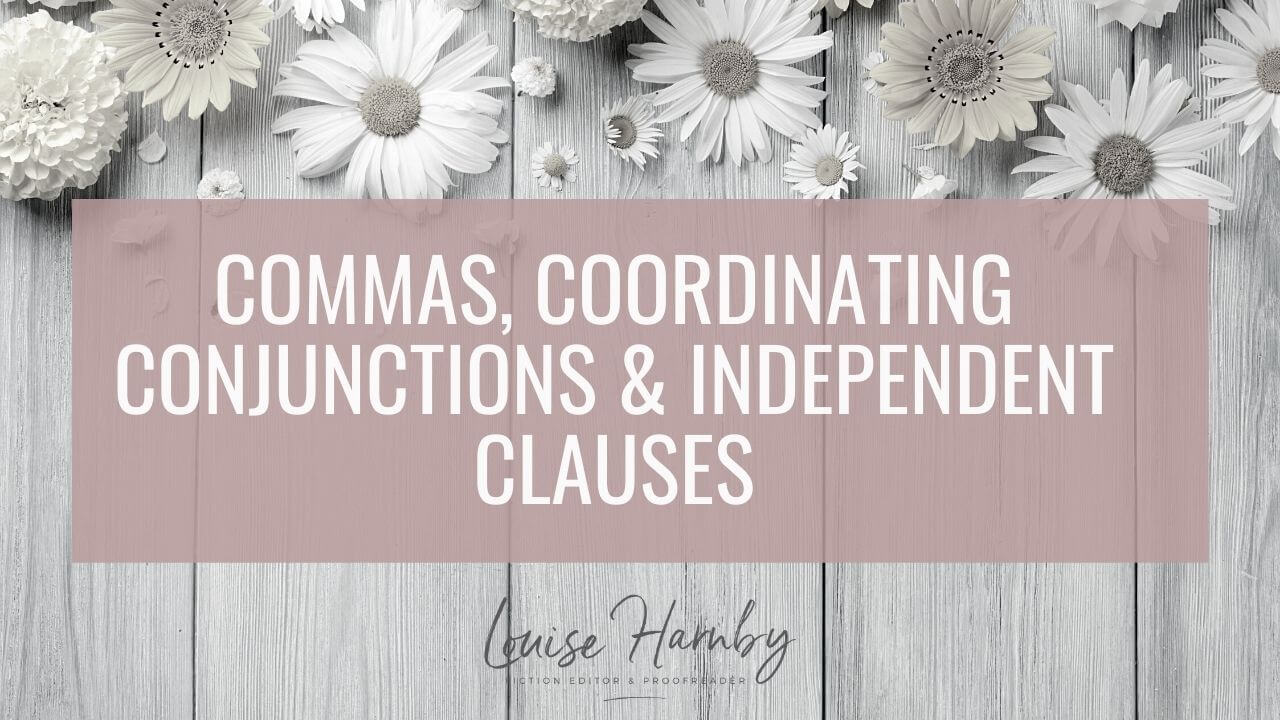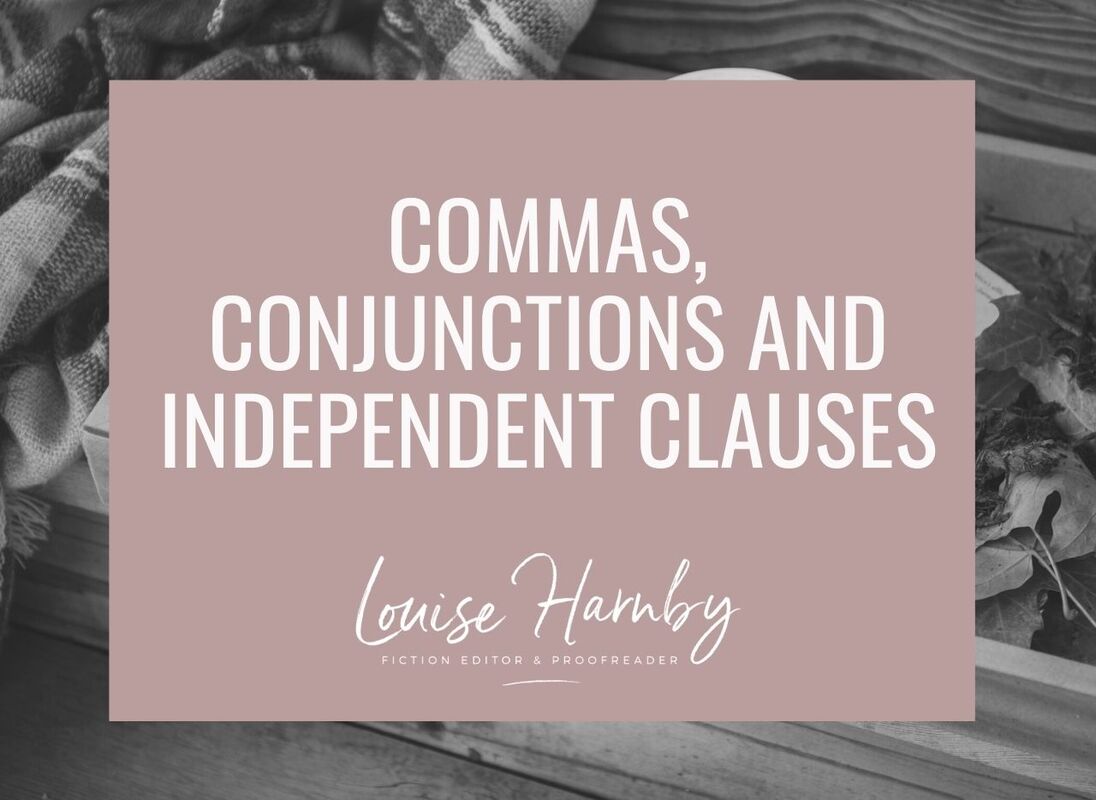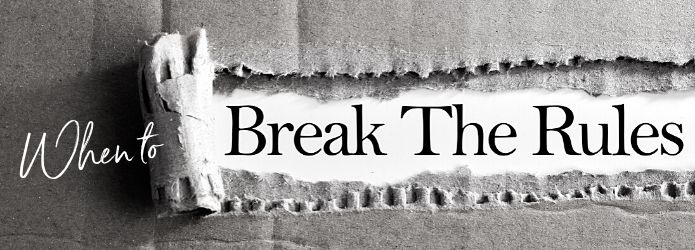|
Are you confused about when to add commas before coordinating conjunctions linking independent clauses? This post offers guidance and a few examples to show you the way.
Rules, convention and meaning
Some writers and editors love a rule. I’m not so keen on the language of ‘rules’ because it sets up a binary mindset that’s focused on ‘wrong’ versus ‘right’ rather than clarity of meaning. Instead, I prefer to think in terms of convention. Grammatical conventions are useful and purposeful. They provide us with a common frame of reference that helps us communicate clearly through the written word. We can start by at least acknowledging the following:
Balancing convention and meaning Writing and editing fiction requires deciding when to break with convention. But how do we work out what works and what doesn’t? Here’s how I frame the balancing act:
So how does that apply to commas, coordinating conjunctions and independent clauses? What are coordinating conjunctions? Coordinating conjunctions are words that join other words or groups of words of equal weight. You might see them referred to in short as FANBOYS:
What are independent clauses?
Independent clauses are groups of words that can stand as a sentence on their own and still make sense. They include a subject and a predicate. Subjects are people/things that are doing something or being something – the noun (the thing) and the adjectival information describing that noun. The four examples given below are all subjects.
Predicates are what they’re doing – the verb (the doing word) and the thing the verb’s acting on. The four examples below are all predicates.
Joining subjects and predicates gives us independent clauses. Here are two simple examples (subject in bold; predicate underlined).
The comma convention
If two or more independent clauses in a sentence are joined by a coordinating conjunction, it’s conventional to place a comma before that conjunction. EXAMPLE AND EVALUATION #1 In the following example, the independent clauses are in bold.
The dog is pale yellow, and it's licking its paws.
The independent clauses could stand on their own as complete sentences and be understood perfectly well. Let’s revisit our balancing act and assess the impact of the comma. The degree to which the comma serves meaning here is, I think, debatable. This is what it looks like without the comma:
The dog is pale yellow and it's licking its paws.
There’s no ambiguity there, and so one could argue that insisting on a comma would be grammatical pedantry. An editor would struggle to justify adding a comma for any other reason than ‘that’s the rule’ or 'I think it looks better' because the meaning is perfectly clear. Could someone argue that the comma enforces the equal weighting of the independent clauses lying either side of the coordinating conjunction? Yes in that it acts as a separator of two ideas: the dog’s colour and what it’s doing to its paws; the one isn't related to the other. And so I certainly wouldn’t remove it if it were already in place; there’s no justification for such an action. MORE COMPLEX CONSTRUCTIONS Many sentences in fiction are more complex. If our example looked like this, we might have a sounder justification for adding the comma:
She stops in the doorway and holds her breath. She’s found it. The dog is pale yellow and it's licking its paws and nipping at the bloodied fur around the wound.
In the revised example below, I think applying the conventional punctuation helps. The rhythm is moderated – we take a little breath when we reach the comma – and experience (through our viewpoint character’s eyes) first the colour of the dog and then what it’s doing and why. The two ideas have a starker separation, and the punctuation convention supports that meaning.
She stops in the doorway and holds her breath. She’s found it. The dog is pale yellow, and it's licking its paws and nipping at the bloodied fur around the wound.
EXAMPLE AND EVALUATION #2 Here’s an excerpt from Robert Ludlum’s The Janson Directive (Orion, 2003, p. 355). Once more, both independent clauses are in bold.
Another dumb, inanimate slug would shatter another skull, and another life would be stricken, erased, turned into the putrid animal matter from which it had been constituted.
The independent clauses could stand on their own as complete sentences and be understood perfectly well. Again, let’s revisit our balancing act and assess the impact of the comma. I think the comma serves meaning and is necessary. Without it, we might start to read the sentence as if the slug would shatter not just a skull but another life too. That’s not what Ludlum is saying. Instead, we’re alerted that another idea is coming into play. A trip-up here means the reader would have to fix the grammar in their head and reread the sentence to make sense of it. That’s a momentary distraction no writer wants.
Breaking with convention in fiction
Let’s have a look at when we might ignore grammatical convention. Below is a short scene I’ve made up. Our protagonist is a forty-year-old woman having a nightmare about a past event.
There’s a huge yellow dog snarling in the doorway, blocking the way out. Its hackles are raised and it’s grinding its teeth and it’s foaming at the mouth and it’s—
I wake, slick with sweat, the six-year-old me hovering spectre-like in my mind’s eye. It’s the third time I’ve had that dream in the past week. There are three independent clauses (and the start of a fourth) linked by a coordinating conjunction. The ‘rule’ says there should be a comma before all those ‘and’s. EVALUATION A pro fiction editor would want to think twice before they start adding in commas because of some rule or other.
Using anaphora doesn’t mean we have to ignore commas, far from it. But what would introducing them do to rhythm and mood? I think the lack of commas helps us to feel our way under the skin of that dream-child because young children in a panic don’t introduce pauses or moderate their speech according to a style manual or a grammar guide. Instead, words fly from their mouths like tiny storms. What we have instead is the sense of terrified disorientation being experienced by the dreamer, one that’s shown rather than told. Commas would moderate the pace and separate the ideas contained in each independent clause; omitting them means we’re offered a stream of terrified consciousness.
More exceptions
Some grammarians do allow for an exception when the independent clauses are short and closely related. In the examples that follow, the coordinating conjunctions are underlined; notice the absence of the preceding comma. Sense isn’t marred because of the missing punctuation.
It’s an eminently sensible exception – one that allows for decluttering but also avoids a separation of ideas that isn’t appropriate.
Summing up The grammatical convention of placing a comma before a coordinating conjunction linking independent clauses is helpful and useful. However, sometimes we can omit those commas:
Style and grammar resources offer guidance, and we should use them, but only in so far as they serve the reader and the story, not because we are rule enforcers. That’s nothing more than a road to literary butchery. More resources to help you line edit with confidence
Louise Harnby is a line editor, copyeditor and proofreader who specializes in working with crime, mystery, suspense and thriller writers.
She is an Advanced Professional Member of the Chartered Institute of Editing and Proofreading (CIEP), a member of ACES, a Partner Member of The Alliance of Independent Authors (ALLi), and co-hosts The Editing Podcast. Visit her business website at Louise Harnby | Fiction Editor & Proofreader, say hello on Twitter at @LouiseHarnby, connect via Facebook and LinkedIn, and check out her books and courses.
14 Comments
Hi Louise, thank you so much for your consistently helpful blog posts.
Reply
Louise Harnby
16/9/2020 08:53:57 am
The examples you give follow the standard, yes. Just bear in mind that sometimes commas are sometimes used as a rhythmic tool in fiction, which is why I tend to shy away from correct/incorrect. There are grammatical conventions/standards but that doesn't mean we should always adhere to them (in my humble view)!
Reply
Thanks for your thoughtful and prompt reply, Louise. That all makes sense, especially in the context of editing fiction.
Louise Harnby
16/9/2020 10:44:54 am
I can't answer that, Kim, because I don't work on those kinds of materials. You'd need to ask the opinion of a non-fiction editor. Denise and I are probably going to discuss this kind of stylistic decision-making in the next season of The Editing Podcast, so listen out for that!
Louise Harnby
26/9/2020 01:07:28 pm
Cheers, Sophie. I recall you and I having a brief conversation about those darn commas! I think our thoughts on the issue chime!
Reply
1/10/2020 01:31:43 am
I'm thrilled you wrote this post, Louise, thank you! I've often pondered this particular comma usage in fiction but have never seen it specifically addressed--let alone in such great detail--by a fiction editor before. You have a wonderful, refreshing way of clarifying grammar issues with sensitivity and common sense. I appreciate it!
Reply
Louise Harnby
1/10/2020 08:51:49 am
You've made my morning, Tess Marie! Thank you so much.
Reply
22/11/2020 10:33:08 am
Thank you for writing this! I find your articles very clear and helpful.
Reply
25/11/2020 01:30:25 pm
Thank you very much for clarifying those tricky little commas, and the dog is still licking its paw.
Reply
25/11/2020 03:14:22 pm
Thank you thank you thank you for expressing and validating my (untrained) opinion on comma usage, especially wrt FANBOYS and independent clauses. The rhythm of the sentence and the meaning are paramount. Use commas where necessary, but don't use them blindly and automatically. :-)
Reply
Brent Miller
16/10/2022 12:40:58 pm
Louise, I'm so grateful that you shared this, and just the concept of convention vs. right/wrong is extremely helpful, as I proofread my way through some sample texts in a course I'm doing and compare my work to the "correct" answers. You've taken a weight off my shoulders that I have been carrying around for a week--the burden of duplicating the "correct" use of commas. I hadn't realized how heavy those little commas were.
Reply
1/11/2022 01:26:39 am
THat's about the best, most balanced discussion I've seen. Younger writers in my critique groups routinely drop commas. But their sentences are often short, which makes the omission less painful. I like your readability criterion. Thank you.
Reply
Leave a Reply. |
BLOG ALERTSIf you'd like me to email you when a new blog post is available, sign up for blog alerts!
TESTIMONIALSDare Rogers'Louise uses her expertise to hone a story until it's razor sharp, while still allowing the author’s voice to remain dominant.'Jeff Carson'I wholeheartedly recommend her services ... Just don’t hire her when I need her.'J B Turner'Sincere thanks for a beautiful and elegant piece of work. First class.'Ayshe Gemedzhy'What makes her stand out and shine is her ability to immerse herself in your story.'Salt Publishing'A million thanks – your mark-up is perfect, as always.'CATEGORIES
All
ARCHIVES
July 2024
|
|
|
|




















 RSS Feed
RSS Feed





